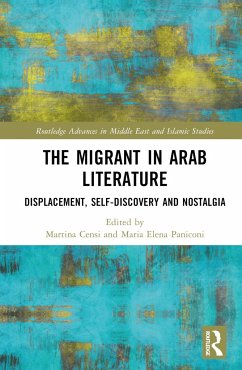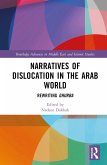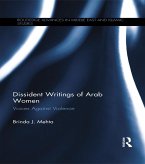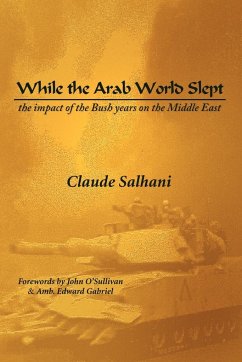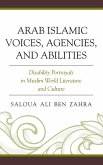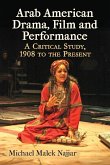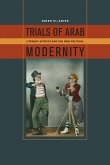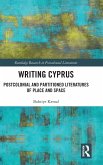The Migrant in Arab Literature
Displacement, Self-Discovery and Nostalgia
Herausgeber: Censi, Martina; Paniconi, Maria Elena
The Migrant in Arab Literature
Displacement, Self-Discovery and Nostalgia
Herausgeber: Censi, Martina; Paniconi, Maria Elena
- Gebundenes Buch
- Merkliste
- Auf die Merkliste
- Bewerten Bewerten
- Teilen
- Produkt teilen
- Produkterinnerung
- Produkterinnerung
This edited book offers a collection of fresh and critical chapters that explore the representation of the migrant subject in modern and contemporary Arabic literature and discuss its role in shaping new forms of transcultural and transnational identities.
Andere Kunden interessierten sich auch für
![Narratives of Dislocation in the Arab World Narratives of Dislocation in the Arab World]() Narratives of Dislocation in the Arab World151,99 €
Narratives of Dislocation in the Arab World151,99 €![Dissident Writings of Arab Women Dissident Writings of Arab Women]() Brinda J. MehtaDissident Writings of Arab Women183,99 €
Brinda J. MehtaDissident Writings of Arab Women183,99 €![While the Arab World Slept While the Arab World Slept]() Claude SalhaniWhile the Arab World Slept17,99 €
Claude SalhaniWhile the Arab World Slept17,99 €![Arab Islamic Voices, Agencies, and Abilities Arab Islamic Voices, Agencies, and Abilities]() Saloua Ali Ben ZahraArab Islamic Voices, Agencies, and Abilities108,99 €
Saloua Ali Ben ZahraArab Islamic Voices, Agencies, and Abilities108,99 €![Arab American Drama, Film and Performance Arab American Drama, Film and Performance]() Michael Malek NajjarArab American Drama, Film and Performance35,99 €
Michael Malek NajjarArab American Drama, Film and Performance35,99 €![Trials of Arab Modernity Trials of Arab Modernity]() Tarek El-ArissTrials of Arab Modernity82,99 €
Tarek El-ArissTrials of Arab Modernity82,99 €![Writing Cyprus Writing Cyprus]() Bahriye KemalWriting Cyprus178,99 €
Bahriye KemalWriting Cyprus178,99 €-
-
-
This edited book offers a collection of fresh and critical chapters that explore the representation of the migrant subject in modern and contemporary Arabic literature and discuss its role in shaping new forms of transcultural and transnational identities.
Produktdetails
- Produktdetails
- Verlag: Routledge
- Seitenzahl: 208
- Erscheinungstermin: 20. Dezember 2022
- Englisch
- Abmessung: 240mm x 161mm x 16mm
- Gewicht: 482g
- ISBN-13: 9780367135881
- ISBN-10: 0367135884
- Artikelnr.: 60040069
- Herstellerkennzeichnung
- Libri GmbH
- Europaallee 1
- 36244 Bad Hersfeld
- gpsr@libri.de
- Verlag: Routledge
- Seitenzahl: 208
- Erscheinungstermin: 20. Dezember 2022
- Englisch
- Abmessung: 240mm x 161mm x 16mm
- Gewicht: 482g
- ISBN-13: 9780367135881
- ISBN-10: 0367135884
- Artikelnr.: 60040069
- Herstellerkennzeichnung
- Libri GmbH
- Europaallee 1
- 36244 Bad Hersfeld
- gpsr@libri.de
Martina Censi is Assistant Professor of Arabic Language and Literature at the University of Bergamo (Italy). She is a member of the Équipe de Recherche Interlangue (ERIMIT) at the University of Rennes 2 (France). In her research, she deals with literary representations of the body, processes of the construction of masculinity and femininity, and migration with a special focus on contemporary Arabic novel. She has published the book Le Corps dans le roman des écrivaines syriennes contemporaines: Dire, écrire, inscrire la différence (2016) and other articles about modern and contemporary Arabic literature. Maria Elena Paniconi is Associate Professor of Arabic Literature at the University of Macerata. She is interested in the rise of the Arab novel and in the dialectics among literary genres during the Arab Nah¿a. She has written articles and essays in the Journal of Arabic Literature and Oriente Moderno on nah¿aw¿ authors and co-edited with Jolanda Guardi the special issue of Oriente Moderno, "Nah¿a Narratives". She wrote the entries on ¿¿h¿ ¿usayn and Müammad ¿usayn Haykal for the third edition of the Encyclopedia of Islam. Her book Bildungsroman and the Arab Novel: Egyptian Intersections (Routledge 2023) explores a corpus of Egyptian canonical novels featuring young protagonists in their path toward adulthood, through the lens of international Bildungsroman.
Introduction (Martina Censi) 1. Migrating to and in Europe beyond the Nah
aw
and Modernist Paradigm: Mudun bi-l
nakh
l by
riq al-
ayyib and Taytanik
t Ifriqiyya by Ab
Bakr Kh
l as Novels of Forced Migration (Maria Elena Paniconi) 2. Transcultural Identities in two Novels by
an
n al-Shaykh (Martina Censi) 3. The Body and the Migrating Subject in the Gulf: Daqq al-
ab
l by Mu
ammad al-Bis
(Cristina Dozio) 4. Writing Arabic in the Land of Migration: Waciny Laredj from
risat al-
il
l: D
n K
sh
t f
al-
az
'ir to Shuraf
t bär al-sham
l: Am
r Amstird
m (Jolanda Guardi) 5. Resistant Assimilation and Hometactics as Decolonial Practices: The Stories of Leilah and Ibrahim in The Orange Trees of Baghdad (Shima Shahbazi) 6. The Negotiation of Identity in Laila Halaby's Once in a Promised Land and West of Jordan (Sara Arami) 7. "Smotherland" Speaks: Syrian Refugee Identity in the Spaces between Media and Literature (Roula Salam) 8. The Global Migration Context and the Contemporary Iraqi Novel (Ikram Masmoudi) 9. Epilogue (Maria Elena Paniconi)
aw
and Modernist Paradigm: Mudun bi-l
nakh
l by
riq al-
ayyib and Taytanik
t Ifriqiyya by Ab
Bakr Kh
l as Novels of Forced Migration (Maria Elena Paniconi) 2. Transcultural Identities in two Novels by
an
n al-Shaykh (Martina Censi) 3. The Body and the Migrating Subject in the Gulf: Daqq al-
ab
l by Mu
ammad al-Bis
(Cristina Dozio) 4. Writing Arabic in the Land of Migration: Waciny Laredj from
risat al-
il
l: D
n K
sh
t f
al-
az
'ir to Shuraf
t bär al-sham
l: Am
r Amstird
m (Jolanda Guardi) 5. Resistant Assimilation and Hometactics as Decolonial Practices: The Stories of Leilah and Ibrahim in The Orange Trees of Baghdad (Shima Shahbazi) 6. The Negotiation of Identity in Laila Halaby's Once in a Promised Land and West of Jordan (Sara Arami) 7. "Smotherland" Speaks: Syrian Refugee Identity in the Spaces between Media and Literature (Roula Salam) 8. The Global Migration Context and the Contemporary Iraqi Novel (Ikram Masmoudi) 9. Epilogue (Maria Elena Paniconi)
Introduction (Martina Censi) 1. Migrating to and in Europe beyond the Nah
aw
and Modernist Paradigm: Mudun bi-l
nakh
l by
riq al-
ayyib and Taytanik
t Ifriqiyya by Ab
Bakr Kh
l as Novels of Forced Migration (Maria Elena Paniconi) 2. Transcultural Identities in two Novels by
an
n al-Shaykh (Martina Censi) 3. The Body and the Migrating Subject in the Gulf: Daqq al-
ab
l by Mu
ammad al-Bis
(Cristina Dozio) 4. Writing Arabic in the Land of Migration: Waciny Laredj from
risat al-
il
l: D
n K
sh
t f
al-
az
'ir to Shuraf
t bär al-sham
l: Am
r Amstird
m (Jolanda Guardi) 5. Resistant Assimilation and Hometactics as Decolonial Practices: The Stories of Leilah and Ibrahim in The Orange Trees of Baghdad (Shima Shahbazi) 6. The Negotiation of Identity in Laila Halaby's Once in a Promised Land and West of Jordan (Sara Arami) 7. "Smotherland" Speaks: Syrian Refugee Identity in the Spaces between Media and Literature (Roula Salam) 8. The Global Migration Context and the Contemporary Iraqi Novel (Ikram Masmoudi) 9. Epilogue (Maria Elena Paniconi)
aw
and Modernist Paradigm: Mudun bi-l
nakh
l by
riq al-
ayyib and Taytanik
t Ifriqiyya by Ab
Bakr Kh
l as Novels of Forced Migration (Maria Elena Paniconi) 2. Transcultural Identities in two Novels by
an
n al-Shaykh (Martina Censi) 3. The Body and the Migrating Subject in the Gulf: Daqq al-
ab
l by Mu
ammad al-Bis
(Cristina Dozio) 4. Writing Arabic in the Land of Migration: Waciny Laredj from
risat al-
il
l: D
n K
sh
t f
al-
az
'ir to Shuraf
t bär al-sham
l: Am
r Amstird
m (Jolanda Guardi) 5. Resistant Assimilation and Hometactics as Decolonial Practices: The Stories of Leilah and Ibrahim in The Orange Trees of Baghdad (Shima Shahbazi) 6. The Negotiation of Identity in Laila Halaby's Once in a Promised Land and West of Jordan (Sara Arami) 7. "Smotherland" Speaks: Syrian Refugee Identity in the Spaces between Media and Literature (Roula Salam) 8. The Global Migration Context and the Contemporary Iraqi Novel (Ikram Masmoudi) 9. Epilogue (Maria Elena Paniconi)

